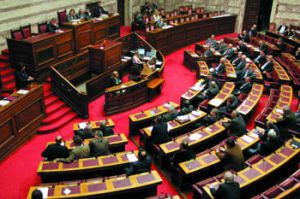 About Us
About Us  Embassy of Greece in London
Embassy of Greece in London  News
News  Greek Parliament endorses 2013 state budget
Greek Parliament endorses 2013 state budget
Greek Parliament endorses 2013 state budget

The Greek parliament passed the 2013 state budget in the early hours of Monday, after a three-day debate in the plenary that wound up at midnight Sunday with a vote.
The budget was passed by 167 votes for, 128 votes against while four depuities declared themselves present in the 300-member parliament, carried by the votes of MPs from the New Democracy (ND) party, PASOK and the Democratic Left (DIMAR), the three parties backing the coalition government of Prime Minister Antonis Samaras. 299 MPs participated in the vote.
Wrapping up the parliamentary debate, premier Samaras said that the country will either exit the crisis united or not at all, calling on all political and social forces of the country to rally for the former.
The prime minister also assured that the financing of the medium-term adjustment programme will go ahead without obstacles.
According to the 2013 budget, the country’s general government deficit is expected to fall to 5.2 pct of GDP in 2013, slightly improved from the 6.6-pct figure this year, while the government will present a primary budget surplus of around 0.4 pct of GDP (after capital spending).
The new budget envisages that the general government deficit will total 9.442 billion euros in 2013, down from 12.882 billion euros in 2012. This decline is expected to come from the implementation of spending cuts worth 7.592 billion euros and budget revenue hikes worth 1.782 billion euros – measures agreed to between the Greek government and the EC-ECB-IMF troika for 2013. These measures include raising the retirement age by two years, pension cuts, reduction in special payrolls in the public sector, abolishing all bonuses in pensions, cutting family benefits and the inclusion of public sector enterprises in a single payroll system.
The budget envisages that the general government’s debt will rise to 346.2 billion euros in 2013, from 340.6 billion euros this year, to 189.1 pct of GDP, from 175.6 pct of GDP respectively. It also envisages a primary surplus of 0.4 pct of GDP (748 million euros) next year after a primary deficit of 1.2 pct of GDP (2.396 billion euros) this year.
On the down side, the Greek economy will suffer yet another year of recession in 2013, with the country’s Gross Domestic Product projected to fall by 4.5 pct, after a 6.5-pct decline this year. The Greek economy is forecast to shrink by 21.5 pct between 2008 to 2013, falling to 183.049 billion euros, down from 194.003 billion euros in 2012.
The unemployment rate is projected to rise to 22.8 pct of the workforce in 2013, from 22.4 pct this year, while the inflation rate is expected to fall to -0.8 pct next year from 1.1 pct in 2012. Next year’s budget also envisages payment of the public sector’s overdue debt to the private sector (7.0 billion euros) in two equal tranches (3.5 billion euros by the end of 2012 and another 3.5 billion euros in 2013).
Budget revenues (regular) are expected to fall by 5.6 pct next year from 2012 to 46.709 billion euros despite additional tax measures included in the budget. Direct tax revenues are expected to fall by 4.6 pct to 19.877 billion euros, income tax revenues are projected to fall by 20.6 pct, while property tax revenues are expected to rise by 15.5 pct to 3.176 billion euros. Revenues from indirect taxes are expected to fall by 6.8 pct in 2013 to 24.430 billion euros.
Budget spending are expected to fall by 9.8 pct to 55.802 billion euros, with primary spending falling by 6.2 pct to 44.650 billion euros and capital spending are projected to fall by 24.2 pct. The budget also envisages that spending on wages and pensions will fall by 10.5 pct to 17.511 billion euros and consumption spending will fall by 18.8 pct.
Capital spending is expected to fall by 24.2 pct to 4.9 pct of GDP in 2013 from 6.0 pct of GDP in 2012.


















